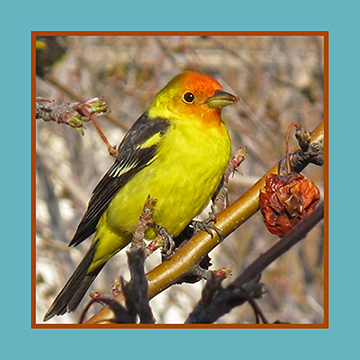What a little bird told me about confronting Alzheimer’s
COFFEE WITH WARREN, with Warren Harbeck
Cochrane Eagle, May 15, 2014

Like a ray of golden sunshine, a Western Tanager visited our apple tree, offering wisdom for confronting Alzheimer’s with beauty and joy. Photo by Warren Harbeck
The other morning my wife Mary Anna looked out our bedroom window, and there he was in our apple tree once more. Our sunshine-feathered friend “Tanny” was back in town to brighten our day – and no doubt to enjoy some of the apples Mary Anna had left on the tree for him and his buddies last fall.
Western Tanagers visit us most years around this time on their way north. What a delight they are after a long winter! And the timing of Tanny’s arrival couldn’t have been better.
I’d been thinking over the many responses I’d received to last week’s column on Alzheimer’s disease and caring for the caregiver. But I wasn’t sure yet how to write this week’s follow-up. Then, in the beauty of the moment, Tanny told me.
Before I share with you what he said, however, let me bring you up to date on two of our longtime email coffee companions, Dr. Andy and Charlene Pickard.
Andy and Charlene lived in Cochrane from 1987 to 2004. Charlene was well known locally as an artist; Andy, as a consultant in fuel and technologies support. Charlene would often sip coffee with me to discuss our columns.
When, after Andy’s retirement from the corporate world, they moved to Qualicum Beach on Vancouver Island, they continued their conversations with us by email. (See my column for April 30, 2008 which featured Andy’s photo of 35 bald eagles perched in a tree visible from their ocean-front property.)
Sadly, Charlene developed signs of dementia and Andy eventually had to place her in a permanent care facility.
The ongoing decisions Andy has had to make prompted him to affirm Sylvia Wylie’s emphasis last week on arranging for Enduring Powers of Attorney.
“Getting a power of attorney signed before a diagnosis is very important,” Andy says. “When Charlene and I had updated our wills in 2006 to make sure everything was correct under BC law, our notary public recommended having powers of attorney at the same time, and that turned out to be a real blessing by making financial dealings on my wife’s behalf ‘easy’ now.”
Andy has had to learn a new style of communicating with Charlene when he visits her. Acknowledging that not all Alzheimer’s situations are the same, he stresses one approach that all can agree on: “creating happy and meaningful moments.”
“Photo albums are turning out to be very useful supports during my visits,” he says. “We can sit together and look through albums of trips from years ago. While I don’t believe that Charlene actually remembers very much, she can look at the pictures of places, people and activities with interest, and we can talk about them as if she did remember.
“And that’s what visitors need to remember: a visit is all about creating happy and meaningful moments with the person. The fact that they may not remember even a few minutes later is irrelevant. They will remember the happy feeling of a pleasant social time with someone. And if they mis-remember names, places, or times, it doesn’t matter.”
Andy stresses the importance of support groups. “The monthly Alzheimer’s support group that I participate in is definitely helpful. I wish I could have started attending sooner,” he says, but while he was still caring for Charlene at home it was difficult to get away even for a couple of hours.
Here is where family and friends can be especially helpful, he says.
“If you know of someone taking care of a family member with dementia, offering to do something with the family member with Alzheimer’s for three hours so the caregiver can attend a support group would be beneficial for both people.”
Which brings me back to what a little bird told me the other day. By his positive presence in our apple tree, Tanny hinted at how moments of beauty can bring relief even from the relentless winter of dementia. In Charlene and Andy’s case, such moments of beauty flow from having legal matters in order, celebrating happy moments, and spelling off the caregiver.
Thanks, Andy and Tanny. More next week.
© 2014 Warren Harbeck
JoinMe@coffeewithwarren.com